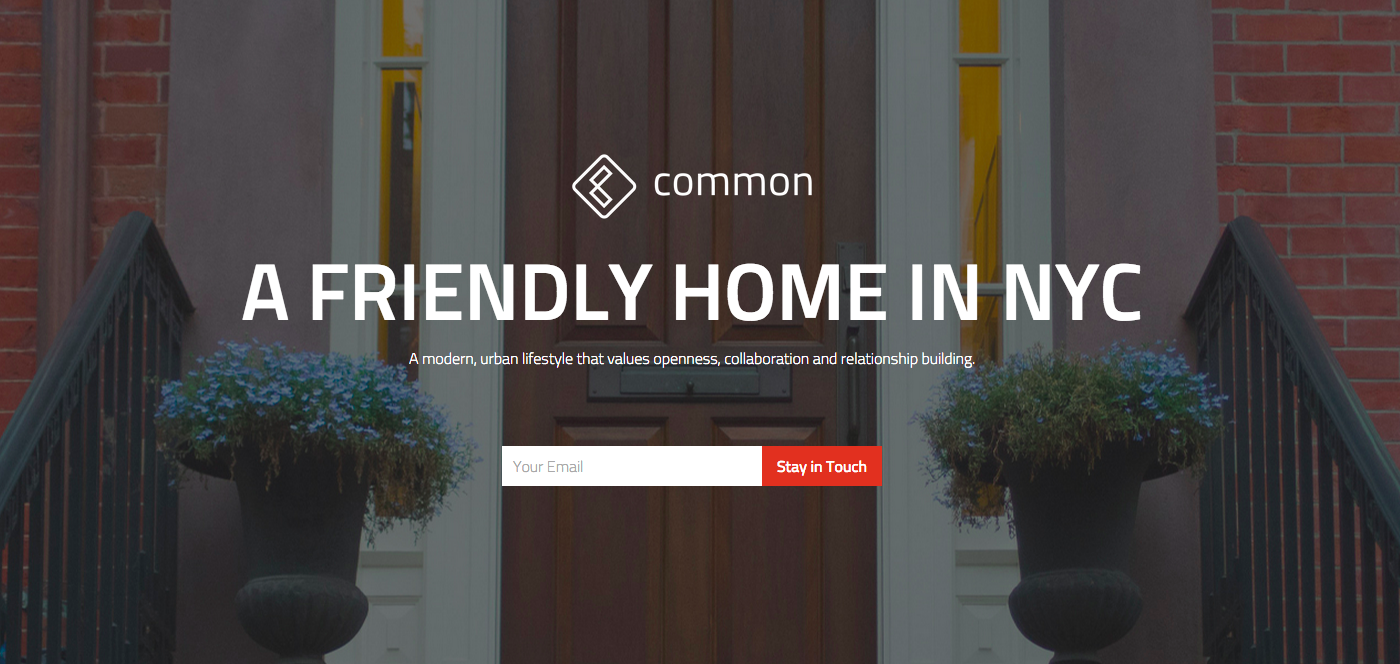The average rent for an apartment in Manhattan was $3985 in June according to MNS. NYC is undoubtedly expensive, especially for a bootstrapped entrepreneur. As New York City seeks to become the next destination for innovation globally, it was only a matter of time before a visionary decided to tackle the cost of housing problem and introduce some flexibility into the system.
This is where Common and its founder Brad Hargreaves come in. Brad also happened to cofound a company called General Assembly, where he had an inside look on the needs of new New Yorkers coming to the city in droves. Armed with a fresh $7.35M in funding led by Maveron, Common is looking to redefine the way in which New Yorkers live by creating better places to live: flexible, furnished, and community-minded. Gone are the traditional income requirements and one-year leases; instead replaced by elegant, month-to-month furnished options.
Launching in the fall, Common seeks to address the needs of a 21st century New Yorker with affordable and flexible housing options with the added benefit of a community in buildings owned by Common and its real estate partners.
Today, we sit down with Brad to discuss the funding, the company’s plans, and the future of NYC housing.
Who were your investors and how much did you raise? Was it seed, Series A, B, etc?
We raised $7.35M in a round led by Maveron. We had some other great investors participate including Lowercase Capital, Slow Ventures, Dave McClure, and a handful of other individual investors.
Tell us about your product or service.
I cofounded General Assembly five years ago. As GA grew into the largest technology and design school in the US, we faced the challenge of more and more students needing housing as they took our programs but couldn’t find a place to live. Housing – especially housing in major cities – can be an insanely difficult process for a newcomer. For instance, most leases in NYC require that a resident make 40x the monthly rent in income. With the average price of a studio in Manhattan at $2,600 per month, that means one needs to make over $100,000 per year just to afford one room.
Traditional leases also require a year-long commitment, a rule that doesn’t jibe with the non-linear career paths many people take today that may require the ability to move to another city on short notice.
So I decided to start Common to create better places for people to live. We provide housing that is flexible, furnished, and community-minded. All our membership agreements are month-to-month, all our rooms come furnished and are well-designed, and we put a lot of effort into making sure our members come together and get to know each other.

How is it different?
We partner with real estate owners and investors to purchase whole, vacant buildings, primarily in emerging neighborhoods. We work with our partners to re-model these buildings and thoughtfully design the spaces. Individuals pay a membership fee to Common to live there.
What was the funding process like?
It was pretty straightforward. I’ve known Jason Stoffer and the team at Maveron for almost five years. They were the first outside investor in General Assembly. We worked side-by-side to build GA, and I became a venture partner at Maveron when I left General Assembly late last year.
When I started working on housing, we spoke about the idea, and they decided to come on board. The Maveron team was a real partner in good times and bad for General Assembly, so working with them on my new company was a no-brainer.
What are the biggest challenges that you faced while raising capital?
I am incredibly fortunate to be where I am. We had a lot of interest in the round, especially since Maveron was on board from the beginning. So the round became over-subscribed pretty quickly, like within two weeks of getting the term sheet from Maveron.
The hardest part was actually saying no to great investors we wanted to work with. I hate saying no. It’s one of the reasons I would be a bad VC. But we didn’t want to over-capitalize the company and further dilute ourselves, so we had to say no to some really talented and passionate investors. That made me sad.
What factors about your business led your investors to write the check?
First, Maveron believed in the opportunity to build an iconic consumer brand in residential real estate. Where we live is such a huge part of our lives, and for many of us helps define who we are. Given this, we believe there is an opportunity to build a better consumer experience.
In addition, our team played a huge part in it. I previously cofounded General Assembly which is now in 14 cities with 4-5,000 students enrolled in a program at any given time. Our CFO is a lawyer by training who has a huge amount of finance and real estate experience over a 30+ year career.
What are the milestones you plan to achieve in the next six months?
We’re going live this fall. At this stage we’re almost entirely focused on getting the customer experience right. If we have low churn and a high net promoter score, we’re doing well.
What advice can you offer companies in New York that do not have a fresh injection of capital in the bank?
I usually tell entrepreneurs to focus on their unit economics – how much does it cost you to produce your product? For how much can you sell it? If you’re making a profit on each unit, getting capital becomes far easier. But even better, you have the choice of deciding whether or not to take capital. Most entrepreneurs and businesses probably shouldn’t take venture capital but should instead focus on building a viable business.
Where do you see the company going now over the near term?
Right now we’re totally focused on getting our launch right. We are opening this fall and we couldn’t be more heads-down with that.
Where is your favorite place to grab a drink in NYC on a nice summer night?
Berg’n.





